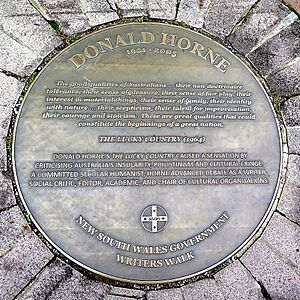Donald Horne facts for kids
Quick facts for kids
Donald Horne AO
|
|
|---|---|
| Born | Donald Richmond Horne 26 December 1921 Kogarah, Sydney, New South Wales, Australia |
| Died | 8 September 2005 (aged 83) Sydney, New South Wales, Australia |
| Occupation | Journalist, writer, social critic, and academic |
| Language | English |
| Nationality | Australian |
| Education | Canterbury Boys High School and The University of Sydney |
| Genre | Non-fiction, fiction, social commentary, autobiography |
| Years active | 1939–2003 |
| Notable works | The Lucky Country (1964) |
| Spouse | Myfanwy Horne |
| Children | 2 |
| Relatives | Ross Gollan (father-in-law) |
Donald Horne (born December 26, 1921, died September 8, 2005) was a famous Australian journalist, writer, and academic. He was known as a public intellectual, which means he shared his ideas widely with the public. He did this from the 1960s until he passed away.
Horne wrote many books, including four novels and over twenty non-fiction works. These books covered history, his own life stories, and thoughts on society and politics. He also worked as an editor for important magazines like The Bulletin and Quadrant. His most famous book was The Lucky Country (1964). In this book, he looked closely at Australian society. He famously wrote, "Australia is a lucky country, run by second-rate people who share its luck." This quote made many people think about Australia's future.
Donald Horne's Early Life
Donald Horne's childhood was described in his book, The Education of Young Donald (1967). He was born in Kogarah, New South Wales. He grew up in Muswellbrook, where his father was a teacher. Later, his family moved to Sydney.
In 1939, he started studying at the University of Sydney. But his studies were stopped because of World War II. After the war, he went to Canberra University College to train as a diplomat. However, he moved back to Sydney in 1945 without finishing his degree. Instead, he began working as a writer for newspapers and magazines.
Even though he didn't finish his first university degree, he was offered a special research job. This was at the University of New South Wales in 1973. He worked there for about fifteen years, holding different teaching and research roles.
Donald Horne's Career Highlights
Horne started his career as a journalist. He worked for several publications owned by Frank Packer. He was a journalist for The Telegraph. Later, he became an editor for magazines like Weekend and The Observer.
He also edited The Bulletin from 1961-1962 and again from 1967-1972. While editor, he removed the magazine's old motto, "Australia for the White Man." This showed his belief in a more inclusive Australia. He also helped edit Quadrant magazine from 1964 to 1966.
In 1973, Horne became a Senior Research Fellow at the University of New South Wales. He became a professor of political science in 1984. He also served on the university's council and was the head of the Faculty of Arts. He retired as an emeritus professor, which means he kept his professor title after retiring. From 1992 to 1995, he was the Chancellor of the University of Canberra. A Chancellor is like the head of a university.
Horne also worked on many important boards related to writing, arts, and citizenship. He was the Chairman of the Australia Council from 1985 to 1990. This council helps support the arts in Australia.
Even though he started with some traditional views, he was always an independent thinker. He didn't stick to one political party. He was well-known for supporting Australia becoming a republic. This means Australia would have its own head of state, not the British monarch. He also believed in a stronger, more independent national identity for Australia. He often spoke about the importance of the arts and improving public discussions.
Donald Horne continued to give interviews almost until the end of his life. He passed away after a long illness. His wife, Myfanwy Horne, finished a book he had started writing. It was published in 2007 as Dying: a memoir.
Awards and Recognition
Donald Horne received many honors for his work.
- In 1982, he was made an Officer of the Order of Australia. This was for his great contributions to literature.
- In 2001, he received the Centenary Medal. This award recognized his help with the Centenary of Federation celebrations in New South Wales.
In 1997, he was named one of Australia's Living National Treasures by the National Trust. This list honors people who have made a huge impact on Australia.
Many Australian universities gave him special honorary degrees. These included Griffith University, the University of New South Wales, the University of Canberra, and the University of Sydney. An honorary degree is given to someone to celebrate their achievements, even if they didn't study there.
In 2002, he received the Australian Humanist of the Year award. This was for his strong support of liberal democracy (a fair and free government), multiculturalism (many cultures living together), tolerance, republicanism, and recognizing Indigenous Australians as Australia's first people.
After his death, his legacy continued.
- In 2008, the University of Canberra started the Donald Horne Institute for Cultural Heritage.
- In 2016, a new award for essay writing was created, called the Horne Prize.
- In 2017, a book called Donald Horne: Selected Writings was published. It was put together by his son, Nick.
 | John T. Biggers |
 | Thomas Blackshear |
 | Mark Bradford |
 | Beverly Buchanan |


